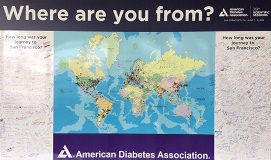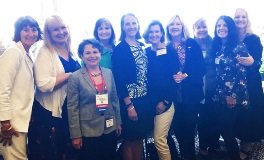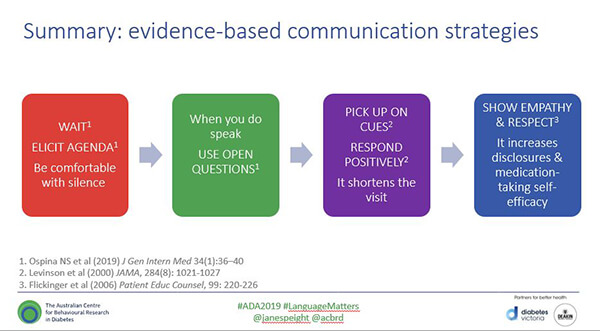
Perspectives on Diabetes Care
This is the official blog of the Association of Diabetes Care & Education Specialists where we share recent research and professional opinions on diabetes care and education.
Current & Past ADCES Blog Articles
ADA Scientific Sessions (#ADA2019): Loads of Learning, Connecting and Recommitting
Jun 17, 2019, 10:41 AM
 Guest blogger, Hope Warshaw, MMSc, RD, CDE and 2016 AADE President, shares her take on attending the recent American Diabetes Association’s Scientific Sessions.
Guest blogger, Hope Warshaw, MMSc, RD, CDE and 2016 AADE President, shares her take on attending the recent American Diabetes Association’s Scientific Sessions.
Once again I attended the American Diabetes Association’s Scientific Sessions (ADA Sci Sessions), held this year in the City by the Bay, San Francisco, June 7 – 11. I’ve attended roughly 20 plus ADA Sci Sessions over the years. The meeting experience for diabetes educators continues, year by year, to improve with more content on topics of interest to us – education innovation, behavior change, psychosocial impact of diabetes and interventions, nutrition, physical activity and more. In turn, the meeting attracts more diabetes educators. (IMHO it’s important for diabetes educators to be seen and heard from at ADA Sci Sessions. Please consider attending next year.) I was asked by AADE to share a few highlights from my vantage point.
- Burden of Disease Calls for Greater Simplicity: Our diabetes care armamentarium continues to grow. We’ve never had more tools in our tool chest – eating plans, types of physical activity, medications, devices, technology-enabled solutions, etc., with which to assist people with diabetes (PWD) and their caregivers. Yet, as noted many times, key indicators of diabetes management (A1c, lipids and blood pressure) have not budged much. For sure there are numerous challenges, from access, to costs, to data management, provider availability and more. But there was overwhelming attention this year to recognizing the human burden and emotional toll of managing diabetes day to day. There were calls to action for providers to listen to PWD more and to simplify diabetes care plans as much as possible. Let’s all think of ways to do this in our everyday practice!
- Nutrition Management News: Have you heard, ADA has updated their nutrition guidance as the publication, Nutrition Therapy for Adults with Diabetes or Prediabetes: A Consensus Report, published in Diabetes Care, May 2019. (Access it here: http://care.diabetesjournals.org/content/42/5/731). (Note ADA is no longer publishing Position Statements. They are just publishing Standards of Care, which they’re updating as “Living Standards” as new publications come out such as this one.) What’s new? Four common denominators of all healthy eating plans providers should focus on and start with: 1) Emphasize consumption of nonstarchy vegetables, 2) Minimize consumption of added sugars and refined grains, 3) Choose whole foods over highly processed foods, 4) Replace sugar-sweetened beverages with water as often as possible. A broad gamut of eating patterns and plans (not “diets”) can help PWD achieve metabolic goals and healthy eating. (See the excellent Table 3 in the document.) Initial and ongoing support via DSMES and MNT and other forms of support matters. In prediabetes and type 2, research now shows that 15% or greater weight loss results in better health outcomes. However, keeping as much of the weight loss off over time is critical. Of note, more than 50% of people with type 1 diabetes have overweight or obesity. That’s a significant change!
- Beyond Two Types of Diabetes: From a number of talks, particularly the address by Louis Philipson, MD, PhD, President, Medicine and Science, and several conversations, the drumbeat that there really are numerous types of diabetes. These may be subsets of type 1 and 2 or distinctly unique types. Philipson focused on his area of interest, monogenic diabetes, but his big and effective take away message was, “Did you start your assessment by asking about the person’s family history of diabetes.” By asking this question perhaps we could prevent some incorrect diagnoses and delay of appropriate therapy. Diabetes educators should feel empowered to raise questions and encourage PWD they counsel to do the same.

- Spotlight on Diabetes Educators as Healthcare Delivery Evolves: I don’t recall an ADA Sci Sessions where I’ve heard so much buzz about the potential value of diabetes educators and the many roles we can play in current and evolving healthcare environments and healthcare delivery. There was mention and discussion of our roles in data management, population health, care coordination, delivery of care and education, delivery of ongoing care and support, use of various technologies to deliver our services, and more…particularly how we have the potential to deliver our services clinically and cost-effectively. It’s critical that we continue to carve out new roles and demonstrate our value! (IMHO I think AADE is on the right track with Project Vision. If you haven’t taken a look, I encourage you to do so: DiabetesEducator.org/Vision)
- Be Language Aware and Person-Centered: As you hopefully realize AADE, championed by Jane Dickinson, PhD, CDE and other colleagues, have developed and continue to drive home the message that the language we use matters to PWD, other clinicians and the world-at-large. (Here’s a link to the excellent resources from AADE: DiabetesEducator.org/Language.) Attention on being language aware and person-centered in our care delivery was due in part to an increased number of sessions about #languagematters, the psychosocial needs of PWD, the importance of emotional wellbeing, how PWD think about and deal with complications and the presence of more PWD at ADA Sci Sessions. This is ALL good! We become better quality providers when we implement the evidence-based communication strategies shared by Professor Jane Speight, PhD, with the Australian Centre for Behavioural Research in Diabetes (ACBRD) and a force in the #languagematters movement. She willingly gave me permission to share this content from one of her slides

For sure I could go on. If you want to gain more learnings and insights from ADA Sci Sessions I encourage you to engage in Twitter and search the hashtag #ADA2019. You’ll find plenty of learnings and insights to sink your teeth into. Also, consider putting attending #ADA2020 on your radar screen – it’s June 12-16 in Chicago. The more diabetes educators at ADA Sci Sessions, the better!